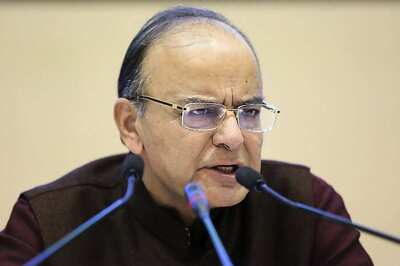
views
India's fiscal deficit target in the near-term is higher than expected and medium-term consolidation is at a more gradual pace than anticipated, said Fitch Ratings in its comments on the just unveiled Union Budget for the financial year beginning April 1.
India, which has often complained its sovereign credit ratings by agencies such as Fitch not reflecting the economy's fundamentals, put the fiscal deficit – the excess of government expenditure over its revenues – at 9.5 per cent of the gross domestic product (GDP) in the current fiscal ending March 31, against a planned 3.5 per cent.
For the next 2021-22 fiscal, the deficit was put at 6.8 per cent of the GDP. "Deficit targets presented in India's central government budget on February 1 are higher, and medium-term consolidation more gradual, than we expected," said Jeremy Zook, Director in Fitch Ratings' Asia-Pacific Sovereigns team.
Zook further noted that: "We placed India's 'BBB-' rating on negative outlook in June 2020, in recognition of the pandemic's impact on growth prospects and the challenges of the high public debt burden." In the Budget for 2021-22, Finance Minister Nirmala Sitharaman unveiled a massive spending plan, which would be met partly from enhanced borrowings, to pull the economy out of the trough.
"The government's prioritization of fiscal support for the population's health and well-being, and ongoing economic recovery are understandable. At the same time, however, there is little fiscal space given India's high public debt ratio prior to the virus shock (around 90 per cent of GDP compared to the 53 per cent 2020 'BBB' median)," he said. The budget, it said, forecasts wider near-term deficits and a more gradual pace of consolidation than anticipated, reaching 4.5 per cent only by FY26.
"We view the economic and revenue assumptions underpinning the budget to be largely credible, although the disinvestment revenue target appears optimistic at over three times higher than the level achieved in FY20," he said. The government is targeting Rs 1.75 lakh crore revenue mop-up from the sale of stakes in state-owned firms.
"This budget also takes further positive steps toward improving fiscal transparency, particularly by bringing the loans from the Food Corporation of India (FCI) onto the budget," Fitch said adding the wider deficits and more gradual pace of consolidation will lift India's government debt and put more onus on the nominal GDP growth outlook of the medium-term debt trajectory – the core to the sovereign rating. Signs of a weaker-than-anticipated economic recovery or a reassessment of medium-term growth potential would make it more challenging to achieve a downward trend in the debt ratio under our forecasts and add to pressure on the rating, he added.
Fitch forecasts real GDP to rebound by 11 per cent in FY22 (2021-22) and grow around 6.6 per cent per annum through FY26. The government's Economic Survey last week projected the economy to contract by a record 7.7 per cent in the current fiscal.
"Higher expenditure, particularly the increase in infrastructure spending in FY22, will likely be supportive of the near-term recovery – which we expect to gather pace due to declining coronavirus cases and vaccine rollout – and possibly reduce longer-term economic scarring," Fitch said. The previously legislated labour market and agricultural reforms are "potentially positive" for the medium-term growth outlook, though they clearly face implementation risks, it said.
The proposed establishment of an asset reconstruction company and asset management company to deal with bad assets in the banking sector is a potential positive, but "more details on the structure and implementation are needed before we can fully assess the impact," it added.
.
Read all the Latest News, Breaking News and Coronavirus News here




















Comments
0 comment